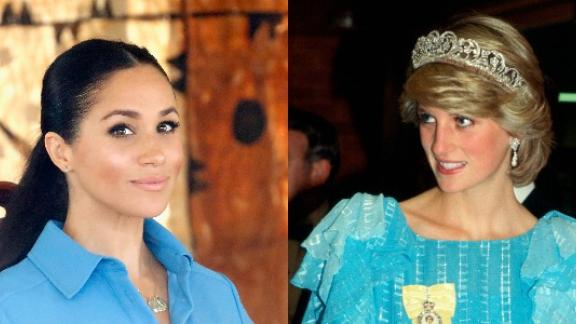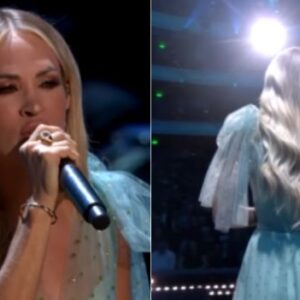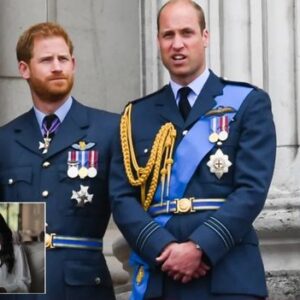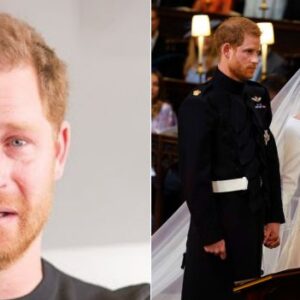
In a shocking twist that has reignited discussions surrounding Meghan Markle and her attempts to draw parallels to the late Princess Diana, the royal commentator Kinsey Scoffield has lambasted Markle for her recent photoshoot in Harper’s Bazaar, which bears striking resemblance to Diana’s iconic cross-legged portrait. This daring replication, according to critics, raises significant questions about Markle’s identity and her motivations behind channeling the spirit of a figure as beloved as Diana.
 As the royal family’s drama unfolds, it is imperative to dissect the implications of Markle’s actions, especially considering the emotional weight of Diana’s legacy. Scoffield, an established voice on royal matters, pointed out that this is not the first time Markle has faced criticism for borrowing from Diana’s enduring style. “When someone lacks a clear sense of identity or direction, they start to lean on imitation,” Scoffield argues forcefully, suggesting that Markle’s continued emulation of Diana is an effort to absorb some of the warmth the public still holds for the late princess.
As the royal family’s drama unfolds, it is imperative to dissect the implications of Markle’s actions, especially considering the emotional weight of Diana’s legacy. Scoffield, an established voice on royal matters, pointed out that this is not the first time Markle has faced criticism for borrowing from Diana’s enduring style. “When someone lacks a clear sense of identity or direction, they start to lean on imitation,” Scoffield argues forcefully, suggesting that Markle’s continued emulation of Diana is an effort to absorb some of the warmth the public still holds for the late princess.
Moreover, the timing of Markle’s photoshoot could not be more provocative. Emerging from the shadows of previous controversies and public scrutiny, Markle appears to be attempting to capture a glimmer of Diana’s allure. However, Scoffield likens this imitation to a crude replication rather than a homage. “It feels vulgar,” she states, emphasizing that the images lack a strong sense of purpose and come off as mere sensationalism aimed at maintaining Markle’s relevance during turbulent times.

This revelation similarly reignites the discussion surrounding Prince Harry’s feelings about his wife invoking memories of his mother’s legacy, particularly during such critical junctures in their public lives. Beyond personal implications for the Duke of Sussex, Markle’s actions beg the question: is this a calculated strategy, or a desperate grasp for acceptance and approval? The same concerns were expressed in a revelation from royal biographer Andrew Lacey, who recounts a stark warning from Prince Philip to his grandson before the royal wedding: “One steps out with actresses; one doesn’t marry them.” This chilling sentiment foreshadowed what many perceived as a problematic integration of Markle into the royal family.
Additionally, accusations about Markle’s superficiality were compounded by the alleged comments of Prince Philip, who reportedly referred to her as the “Duchess of Windsor,” echoing negative sentiments around Wallis Simpson—a controversial figure in royal history. This reiterates that skepticism surrounding Markle stretches beyond mere tabloid headlines and reflects longstanding apprehensions from the upper echelons of the royal hierarchy.
Meanwhile, shocking revelations from former NBC anchor Katie Couric have emerged, outlining her interactions with the infamous Jeffrey Epstein during a 2010 gathering at his New York mansion. Couric reportedly engaged in casual conversations and camaraderie with the convicted sex offender over dinner—revealing a stark juxtaposition in the media landscape where today, her condemnations of figures like Donald Trump have put her under further scrutiny. The discussion surrounding the dinner paints a disturbing picture of the normalization of celebrity interaction with individuals tied to criminal acts.

This era of revelations does not stop there; the premiere of the new Wicked movie has also become embroiled in controversy, as audiences were greeted with a curious trigger warning prior to viewing. With wildly successful roots on Broadway and the expectation of a blockbuster film, the need for a mental preparation notice over ‘characters casting spells’ draws scorn from many audience members, signaling a societal shift towards heightened sensitivity in entertainment.
Amid these multifaceted stories breaking through the media cycle, the question remains: how entrenched are these phenomena in the public’s consciousness? Kinsey Scoffield’s insistence that Markle’s replication feels more like an exploitation of Diana’s likeness than a respectful homage raises alarm bells around identity construction, while the ongoing saga involving Katie Couric complicates the dynamics of media trust and celebrity accountability.
In light of these events, the urgency for the public to remain engaged and aware has never been clearer. The stories surrounding Meghan Markle, Jeffrey Epstein, and the implications of media narratives push boundaries that compel us to question, reflect, and respond to the ever-evolving relationship between celebrity culture, legacy, and accountability. As we navigate through this storm of revelations, it is apparent that the impacts of these events will resonate for time to come, ensuring that the discussions surrounding their authenticity and implications are far from over.




